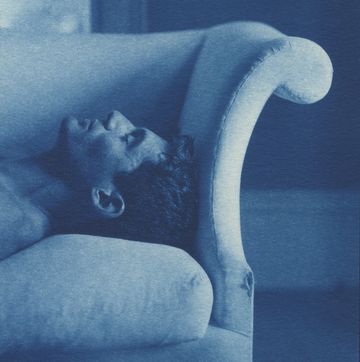This article was originally published in the March 2017 issue of Esquire. To read every Esquire story ever published, subscribe to All-Access.
Whenever Tom Manning began to feel bad, he thought of the young woman in her twenties with terminal brain cancer he met at the rehab facility in Boston where he spent nearly a month recovering after his penis amputation. Her resolve was a reminder of how things could be so much worse, a slap in the face. Sometimes, that memory wasn't enough—he'd need a little more help. So when Manning would feel the slightest itch of self-pity, he'd look in the mirror and slap himself across the cheek, hard enough to feel the sting. Stupid jerk, he'd think. Don't do that again. Still, it was nearly impossible not to sometimes ruminate on how he ended up at that point. On a cold morning in January 2012, the sixty-year-old bank courier was easing a hand truck loaded with heavy boxes down a slushy ramp behind his company's office in downtown Boston. His legs slipped out from under him and Manning went down hard. The cart, loaded with a hundred pounds of paperwork, toppled onto him, forcing a portion of his colon through his lower intestinal wall and steamrolling his genitals. The impact felt like an explosion, but shock muffled the initial pain. A water deliveryman who had heard the crash and Manning's howl rushed over to help him back on his feet. He thanked the guy, told him he was fine, and trudged up to the employee restroom to assess the damage, grabbing clean clothes from his locker on the way.
Once he was behind a locked door, Manning carefully peeled off his military-style cargo pants, long johns, and underwear, each layer soaked through with Boston slush. The impact had caused the button fly of his pants to rake across his genitals, and as the shock wore off, his entire groin began to throb in time with his heartbeat. There was blood, but Manning couldn't tell where it was coming from because his penis had swollen to more than twice its usual size. Everything looked wrong.
Manning, usually an unstoppable chatterbox, was the sort to suffer in silence, so he downplayed the severity of the fall to his coworkers. The company had recently laid off several employees, and the one guy who knew Manning's routes was tied up at another site. Manning didn't want to leave his boss in the lurch and get fired in the process. Besides, he figured the problem would correct itself. After half an hour of damage assessment, he threw on a dry change of clothes and went back to work.
Manning loved the job. His main account for ten years running was one of the largest asset-management corporations in the world, the type of place that counted Fortune 500 companies among its clientele. He was responsible for transporting some of its most sensitive documents—the guts, as they were called—around Boston. His career prior to that had been a mishmash of jobs that brought him little satisfaction: overseeing the cleaning crew at Fenway Park, digging graves in Jewish cemeteries with a friend, and running a small trucking company. He had brokered wholesale fish deals for a time until regulators came sniffing around and shut down the operation. He always managed to get by, a skill his mother, Florence—who'd worked full-time while raising Tom and his three siblings alone in the rough neighborhood of Dorchester—had taught him by example.
For the next two months, Manning self-treated his wound with hydrogen peroxide to disinfect and aspirin to dull the pain. But his penis remained crushed, his colon was still located in the wrong ZIP code, and the unrelenting agony of his pulverized testicles made it hard to sleep more than a few hours at a time. He still worked—he hadn't taken a vacation in four and a half years—but he hobbled around and sometimes had to ask coworkers to help him move the heaviest loads.
Finally, in March—eight weeks after his genitals were pancaked—Manning finally sought help at Massachusetts General Hospital, Harvard University's renowned teaching affiliate in downtown Boston. This is where the Saudis come to be treated, Manning thought. There's no better place to get help.
Over the course of twelve hours, waves of doctors came through to ogle, poke, and image Manning's crotch. The verdict was that he needed surgery. Doctors would return his colon to its rightful place and reconstruct a portion of his genitals. Though the procedure sounded deeply uncomfortable, having a prognosis after weeks of worry gave him hope of a return to normalcy.
Before his surgery, Manning returned to meet Adam Feldman, one of the hospital's best urologists. After a careful examination, Feldman sat back, lines of concern creasing his forehead. "I think you have a tumor on your penis," he said.
A biopsy confirmed Feldman's suspicion. Manning had penile cancer, a rare and aggressive disease that affects about two thousand men in the United States each year. Cancerous cells had already invaded a substantial amount of his penile tissue and could soon spread to his lymph nodes and beyond, at which point Manning would be as good as dead; he'd last six months if he was lucky. Radiation couldn't slow the spread, Feldman told him. The best path forward was to cut off his penis.
Manning was blindsided. Would he look like a Ken doll? Would he be the only man in Boston who had to pee sitting down? Would he ever have an orgasm again? Maybe it would be best to let the cancer run its course, he thought. After all, every guy's got an expiration date.
Manning went home to the two-bedroom on Beacon Hill where he'd lived for the last thirty-two years, to think alone. He was used to figuring through problems on his own. He didn't want to worry Florence, his brother, Charles, or his two sisters, Edna and Debra, all of whom had kids and jobs and worries of their own. Nor did he want to tell his buddies because they'd probably just crack jokes. He wasn't dating anyone at the time, and besides, he'd never been one for commitment, favoring the type of girls his mom called "trashy women"—models, strippers, a Rockette. It didn't take him long to decide that he didn't want to die. He told his doctors he was ready to give up his penis to save his life.
So in the spring of 2012, he walked into Mass General for what he thought would be the last time as a whole man. Over the course of several hours, as Manning lay unconscious, Feldman removed all but a tiny stub of his penis, less than an inch in length, and created an opening through which a catheter would allow him to pee.
When he came to, groggy and hopped up on pain meds, Manning's mind started whirring. Doctors could reattach hands; they could transplant faces. He recalled a news report about scientists who'd grown a human ear on a mouse's back. Why not try to grow a penis in the same way and sew it on? Later that day, when Feldman visited him in recovery, Manning said, with the thick Boston accent of an extra on Cheers, "Hey, doc, if you guys ever do a penis transplant, I'm your guy."
At that time, surgically removing an intact member from a donor and attaching it to a recipient had never been performed in the United States. Until last year, it had been attempted only twice worldwide: once in 2006 in China, and again in 2014 in South Africa. The first case is poorly documented; the most common version of the story is that the surgery went well and the organ seemed to take, but the wife of the forty- four-year-old recipient panicked at the idea that he now had someone else's penis. They apparently demanded that it be removed. The South African case was both better chronicled and a lasting success. Surgeons at Tygerberg Hospital in Cape Town transplanted a donor's organ onto a twenty-one-year-old who'd lost his penis three years earlier after a botched circumcision resulted in gangrene.
Manning had read about both cases after his amputation, but he had no idea that the very hospital where he had lost his manhood was laying the groundwork for surgeons to attempt America's first-ever penis transplant.
The project's origin dates to late 2012, after a presentation on hand transplants by Curtis L. Cetrulo, a plastic- and reconstructive-surgery specialist at Mass General. In the post-lecture scrum, he and his friend and colleague Dicken Ko, a celebrated urological surgeon, struck up a conversation with an attendee, a former Mass General surgical fellow who'd served as a U. S. Navy surgeon. The man detailed the epidemic of lower-body blast injuries in Iraq and Afghanistan. Improvements in field-trauma surgery, as well as Kevlar body armor, were allowing soldiers to survive injuries that would have easily killed them in the past. In effect, this meant that more patients than ever were arriving at military hospitals with injuries to the face and the extremities and—because of the prevalence of improvised explosive devices, which blast upward—devastating genital-urinary wounds. Injuries to the groin, the former fellow pointed out, are particularly insidious because they have no fix and are often suffered in silence.
Cetrulo and Ko had already been discussing the possibility of penis transplants for months. They long understood the impact such a procedure could have for men who'd lost their penis, a population who are at risk for suicide, Cetrulo says. "They're despondent patients who really see themselves as having no hope." The conversation with the former fellow served as Cetrulo and Ko's catalyst. They both had the same thought: There has to be a better way.
The best medicine could offer a man who'd lost his penis—whether he was a blast-damaged infantryman or a cancer patient—was a crude reconstruction, Cetrulo says. "You take a piece of tissue"—from the thigh or forearm—"and roll it into a tube of skin to make it look like a phallus." The resulting "penis" resembles tubed deli meat and is prone to infection. Though many recipients do experience the return of erotic sensation, they cannot achieve an erection without a prosthetic implant. Patients often have difficulty urinating while standing. They're rarely able to have intercourse.
Cetrulo and Ko were not the only ones in the country to reach this conclusion. In 2015, a team at Johns Hopkins announced that they planned to attempt a penis transplant for one of the nearly fourteen hundred soldiers who'd experienced some form of devastating groin injury, virtually all of them in Iraq or Afghanistan. Which of the two institutions—Hopkins or Mass General—would perform the transplant first was simply a matter of who could first clear their hospital's approval process and match a patient with a donor.
The technology for such a procedure was already in place, thanks to advances in face- and hand-transplant surgery. These procedures are known as "vascularized composite allografts," or VCAs. While a kidney or liver is basically plug-and-play, made up almost entirely of a single tissue type and installed with only a few attachments, a VCA comprises different kinds of tissue—skin, muscle, nerve—and requires the hookup of blood vessels. A penis transplant is a VCA.
When it comes to vital organs, the known risks of transplants are outweighed by the benefits; a patient will die without, say, a functioning heart. But a missing hand, a mangled face, or an amputated penis won't end a person's life. So doctors need to consider that the patient will endure an arduous surgery with a not-insignificant risk of failure that, if successful, will require a lifelong course of kidney-damaging immunosuppressants. What's more, transplanted organs are also not as durable as the originals. They wear out.
Despite these concerns, Cetrulo and Ko believed that a penis transplant was a risk worth taking. They worked for more than three years to develop their protocol, consult with peers, and navigate through the ethical reservations. They helped raise funds for research—which included practice sessions on cadavers at the New England Organ Bank—and taught counselors how to speak with donor families who might have difficulty understanding why a hospital would want their loved one's penis.
Finally, in December 2015, they got the green light—and the funding for two transplants—from higher-ups at Mass General. Before they could begin the search for their first patient, Adam Feldman told them about Tom Manning.
At this point, Manning had been living for nearly four years without his penis. Those early days were a blur. He endured five surgeries in quick succession: to repair his colon and diaphragm, to amputate his penis, to repair a blockage that caused him to go two days without urinating, and to deal with a hematoma that caused his testicles to blow up to the size of softballs. At times, he joked to his friends, it felt as if he had wandered into some twisted Groucho Marx routine—first a guy gets his Tic Tac lopped off; then his Milk Duds inflate like balloons.
The fifth procedure—to see if the cancer had spread—was particularly nasty. Feldman peeled apart skin and muscle on Manning's upper legs and groin to biopsy his lymph nodes. The surgery was invasive and bloody and required Manning to stay at a rehab facility for weeks afterward. The pain didn't bother him so much as the waiting: The results took nearly two weeks to process. He lay in his bed for days, wondering if he'd given up his penis only to die of cancer.
When Manning saw Feldman's number pop up on his phone, he answered the call as quickly as his fingers would allow him. "You're clean," Feldman said. Manning sat silent for almost a full minute before mustering the coherence to say thank you.
Now he was free to focus on his new reality. All that remained of Manning's outward reproductive machinery were testicles and a stub. He had to sit down to pee. There were no orgasms, by himself or with someone else. Manning accepted his fate. What choice did he have? And yet one thought kept pinging around his brain: Someone, somewhere, is going to try a penis transplant in the United States.
Manning bought a medical textbook and in his free time learned all he could about the internal structure of the phallus. Staring at renderings of the honeycomblike tissue punctuated by vessels and nerves, he thought up his own crude way to connect a transplant using tiny stents—even smaller than the straws you get in cocktail drinks, he thought—to ensure healthy blood flow.
Until he could once again move around comfortably, Manning was out of work. He gave up his apartment and moved in with his mother, who was now retired, forty-five minutes south of the city.
The amputation site healed quickly, but the pain from the accident wouldn't abate. Manning's testicles throbbed as if every day he'd been kicked in the groin anew. The only thing that helped was nerve medication that he took three times daily, but a dose didn't last long enough to allow for a full night's sleep. Doctors were happy to give him stronger meds for the pain, but Manning had been sober his entire life—he'd never so much as smoked a cigarette. He took the oxycodone in his medicine cabinet only on the worst days. All the while he yammered on to anyone who'd listen that he hoped to someday get a transplant.
When Feldman's number popped up on his phone again in February 2016, Manning was sure something was wrong. The cancer must've returned; he'd have only a few months to live. He took a deep breath and answered. "Are you still interested in that transplant?" Feldman asked. This time, Manning had no trouble with words: "Let's do it," he said. "Let's get it done."
First came a lengthy screening process to make sure that Manning's body and mind were able to handle a VCA. The surgeons and psychologists were cautious; there wasn't any long-term data or substantial body of literature they could pull from to understand all the risks Manning might endure. They knew from Feldman that Manning had a tendency to keep his symptoms and complications to himself. In the case of a novel procedure such as this, that alone could be the difference between success (new and improved penis!) and failure (no penis at all). Not all previous VCA surgeries had gone to plan: The New Zealand man who received the first hand transplant, in 1998, had it removed three years later because he had become "mentally detached" from it; a Virginia man who had had the most substantial face transplant to date in 2012 was, two years later, injecting whiskey into his stomach via a feeding tube until he fell unconscious.
Once Manning's mental stability was confirmed, Cetrulo and Ko laid out the risks in unvarnished terms: The surgery might fail. It could turn out to be much more complicated than anticipated. And even in the best-case scenario, Manning would be on antirejection drugs for the rest of his life. The most likely worst-case scenario was that the surgery wouldn't work and he'd go back to who he was before: a man sans penis. Manning wasn't dissuaded. He thought, You've got one shot, and you're going to take it. At least you'll be able to look in the mirror and say, "I did everything I could."
The surgeons established three recovery goals at the outset: appearance, ability to pass urine, and sexual functionality. They couldn't promise that any of them would be successful. Manning could tell that Cetrulo and Ko were concerned about how he'd react if the surgery failed. He assured them that if that was the outcome, he wouldn't hold a grudge. This wasn't something he wanted to do; it was something he had to.
Florence had worried for four years that all her son's talk about transplants was only setting him up for disappointment. When she heard the news, she was excited but also realistic: "Stay positive, Tommy," she told him. "But don't get your hopes up." Manning set about scheduling the hospital visits for an array of medical tests, which meant taking time off work, which also meant that he needed to tell his bosses what was going on. Mostly, they were surprised that he'd been living and working for the last four years without a penis.
Transplant medicine is a waiting game. It can take months or years for an organ to surface; the timing depends on the death of someone who matches the patient's needs, which is no small matter. An acceptable organ needs to meet several requirements, including skin tone, blood type, and a laundry list of disease screenings. Plus, this was the first time anyone had ever gone looking for one. It was, in the words of the New England Organ Bank's CEO, "an unusual ask."
In May 2016, the families of two potential donors were approached, marking the first time any U.S. organ bank had asked relatives to contribute their loved one's penis. To everyone's surprise, both said yes. One donor's organ wasn't viable, but the other—belonging to a young man on life support in Maine—was a perfect match.
Transplants typically happen with little notice—a donor with viable organs dies and doctors need to act immediately. Ko was at a urology conference on the West Coast when he received the news; he rushed to the airport to catch the next flight home but didn't get back until the tail end of Manning's procedure. Cetrulo had traveled to Maine with a team of surgeons from Mass General to procure the penis, along with the heart, lungs, liver, pancreas, intestines, and kidneys. The young man's organs would go on to save six lives and improve the quality of one more—Tom Manning's. The donor's parents asked that no information about their son be provided, but released a brief statement at the time saying that the donation had been "helpful through a difficult time."
Back at Mass General, a team prepped Manning and wheeled him into the operating room. Thirteen surgeons took part in the fifteen-hour procedure, a different specialist stepping in to painstakingly attach each of five blood vessels and two major nerves that run through the phallus. A catheter was strung through the urethra, and the wound was sewn up.
He woke up in the ICU midday on Mother's Day to find his arms tied down so that he wouldn't reflexively reach for the surgical site. The wound wasn't yet dressed—it needed exposure to air to help dry it out—and all that separated Manning's new penis from the threat of bacterial infection were a few layers of gauze. For several days, he was scared to look down. When he finally did, it appeared to him as though his groin had been mangled in a car wreck. The new area was so badly swollen and discolored that it was unrecognizable as male genitals. Doctors kept telling him it looked great, but they were obviously working with a very different definition of the word. He didn't look again for a full week; by that time, the swelling had subsided and the surgical site was healing. Still weird, but better. The member, he was pleased to see, was just about the same size as what he'd had before.
Surgeons were optimistic from the start: Blood flow appeared to be normal, and there were no early signs of rejection. The next recovery goal was urination. Ko removed the catheter three weeks after the surgery, and Manning was able to pee freely, though sitting down and into a bottle. A couple of weeks later came the real test, something that Manning hadn't done in four years: pissing while standing up. To accomplish this, he'd have to control when the stream began, how quickly it came out, and in what direction it headed. Ko put a plastic target over the toilet in his office bathroom, told Manning to hit it, and stepped out.
As Manning lowered his pants and prepared to fire, he thought, I came out here to hit the bull's-eye, and I'm gonna hit the freaking bull's-eye. The urine started flowing, and Manning blasted the target, unleashing a stream with the vigor of a guy who'd been holding it in for hours. "All right!" he shouted, loud enough that Dr. Ko and his colleagues outside the door burst into laughter.
The recovery goal that remained to be met—and still does—is sexual functionality. Whether or not Manning ever has another erection will be determined by a number of complex physiological factors. An erection occurs when blood rushes into the minuscule vessels of the penis. Manning's flow remains good, his surgeons say. What maintains the erection, though, is a series of muscle and tissue interactions that constrict the blood so it doesn't drain away. Years without erections can leave these tissues inflexible, making it difficult to achieve and maintain a hard-on. This is common in men who've had prostate surgery, and it's a major concern in Manning's case.
Manning began taking Cialis shortly after the surgery to encourage his blood flow, and one of his immunosuppressants promotes nerve regeneration in the hope of regaining sensation. "We call it penile rehabilitation," Feldman says. The results so far are encouraging: Manning occasionally feels sparks in his penis, a tingling akin to a foot falling asleep. A few times, he's felt what seems to be his penis swelling, though it hasn't done so. "The sensation is there," Manning says, "but it's nothing like it was before."
If the Cialis doesn't lead to reliable erections, there are other measures available—pumps, for instance, or implants. "They have all kinds of things that they can give me," Manning says. When he was in the recovery ward postsurgery, the nurses would often joke with him, asking if he had any idea how many women would want to sleep with the recipient of America's first-ever penis transplant. He hopes to one day return with a warning: "Ladies, I could be the most dangerous man in America right now—a sixty-five-year-old man with a young man's penis!"
Manning is honest and unguarded, but he's not inclined toward deep self-reflection. When asked to explain why he didn't feel like a whole person without his penis, he tends to deflect—"Imagine how you'd feel," he'll say and leave it at that. Often, he'll compare the feeling to another situation by pointing out, for example, that women who have mastectomies often receive reconstructions not because they need them but because they don't feel complete once their breasts are gone.
He takes forty pills a day to help protect his new penis from his body, and his body from infection. Because of the side effects and his lack of physical activity, he's put on some weight. Pain from his once-crushed testicles still wakes him in the middle of the night. He has difficulty going down staircases. He feels foggy. He forgets things. He used to read The Boston Globe front to back every day, but now he's lucky if he can focus enough to get through the front section. He's desperate to work again but knows that's impossible for now.
Manning's biggest complaint, though, is the shakes, a result of the immunosuppressants that will eventually be scaled back but never eliminated. He's developed some tricks to control them, such as keeping his hands clasped together or gripping the arms of a chair. But when he puts a hand out and attempts to hold it flat, it vibrates badly. "The meds beat me up really bad," he says. He picks up a pen and slowly writes his name. The result looks like the readout from a Geiger counter.
Shortly after last Thanksgiving, I sat with him at the kitchen table in Florence's home in Halifax, a short drive inland from Plymouth Rock. Florence and her son share a doublewide trailer in a tidy mobile park shaded by fir trees. He spends much of his days in a recliner, trying to read the paper and watching cable news. At least once a week he heads to Mass General for blood tests, and to visit with his ever-growing menagerie of physicians—Cetrulo, Ko, Feldman, and Cori Tanrikut, a reproductive specialist whom Manning refers to as "my penis doctor."
Florence is eighty-three but looks ten years younger. She does her best to minimize stress and anxiety in her older son's life. Because Manning is under strict orders not to strain himself, she plays the role of housekeeper, cook, chauffeur, and nurse. She wants to know everything about his recovery, no matter how uncomfortable the specifics. At first Manning had trouble talking to her so frankly about his penis and its problems, but it no longer bothers either of them. "You lose your vanity real quick," Manning says.
The only time they argue, Florence says, is about food, because Manning is on a strict diet to limit his potassium and doesn't always want to follow it. But he tries. He starts five mornings each week with a bowl of cornflakes, and has scrambled eggs on the other two. He can have fish, chicken, and vegetables, but only in small servings, and very little fruit. Occasionally, Manning's allowed a small bowl of ice cream, his favorite food. Most often, dessert is sugar-free Jell-O, "like I'm still at the hospital," he says.
He was anxiously waiting to hear when his next surgery would be scheduled this time, not for his groin but for his heart. Back when Manning went in for the battery of pretransplant tests in May 2016, he failed one: a heart stress test that revealed a calcified aortic valve. He was allowed to proceed with the transplant so long as he promised to address the cardiac problem shortly thereafter; doctors warned he could have a heart attack at any moment. Before this story is published, surgeons will cut into his chest to replace the damaged valve with a new one, probably from a pig or a calf. Open-heart surgery is a brutal procedure for any patient, but it's even more risky for Manning. He'll have to stop taking some of his antirejection meds, and it's likely that he'll need at least short-term dialysis during recovery.
For Manning, it's just another hiccup. Once the surgery is completed, he expects to be back to full strength. He'll drop the added pounds, resume a more active life, and, he hopes, go back to ferrying bank guts around Boston.
Manning knows he is one of the unluckiest men in America, and also one of the luckiest. "If I didn't have the accident, they wouldn't have found the cancer," he says. "I go for a transplant and they realize I have a heart problem, which I never would have found, either." His life was saved—twice—by happenstance. "There's no doubt in my mind I would've died, but I didn't," he laughs. "Must've disappointed a few people."
Men who develop penile cancer often need to undergo amputation. Factor in the wounded soldiers and those who've suffered freak accidents with heavy machinery, and the number of males walking America's streets with no penis is higher than one might expect. "You just don't hear about it because that's the last thing a man wants to tell the world," says Ko.
But Manning felt differently. He did his first interviews from his hospital room five days after the surgery. ("We were floored," says Ko. "We did not count on Tom.") Four months later, he took the train to New York City to tape The Dr. Oz Show and hasn't stopped talking since. His new name, he likes to joke, is Thomas J. Penis.
"I wasn't shooting for number one," he says. "I was shooting to be normal." He's wary—perhaps overly so—of being turned into the butt of someone's twisted joke, but he accepts that it's a by-product of being honest. "When I talk to people about this little journey I'm on, they say, 'Oh, wow, man, congratulations,' " he says. "But behind the scenes a lot of them think, What a fucking freak." The problem, he believes, is that most men can't envision what it's like to lose a penis, let alone need a new one. "But you ask every guy, of every ethnicity, 'What makes you a man?' I bet the penis would be the first thing."
These days, Manning is finding sturdy ground as a penis-transplant spokesman. He was recently invited to present at a gathering of retired CEOs, at a restaurant on Boston's affluent South Shore. His surgeons have told him that as soon as he's "100 percent" functional, they hope to visit Walter Reed hospital, outside Washington, D. C., to meet with the injured veterans who might one day benefit from a similar procedure. They may even lobby Congress to allocate funds for the servicemen. While Manning plans to be honest with the vets about the downsides—difficult surgery, painful recovery, the pills, the side effects, the boredom—he wants these men to know that the potential benefits are enormous. Maybe a young man will once again feel comfortable being naked in front of others. Maybe he'll pee standing up. And maybe—if all goes well—he'll have sex, and even father children without medical assistance.
The South African surgeon who conducted the first successful transplant told reporters at a press conference: "If you don't have a penis, you are essentially dead. If you give a penis back, you can bring them back to life." Manning never felt dead, but he imagines things might have been different if this had happened when he was younger. He's lucky he's so old: He's had many decades to sow oats, and he won't need to take immunosuppressants for as long as a thirty-year-old would. A younger man will endure more hardships because of the meds and will face potentially greater psychological challenges. Still, Manning hopes that men who are on the brink of giving up will find inspiration in his story.
He tries not to think about sex, because it's not an option for the time being. That doesn't mean Manning has resigned himself to a life without orgasms; he looks forward to dating again. He's already been propositioned once, but he politely rebuffed the woman's offer, telling her, "Right now you'd just be disappointed." If and when he has intercourse, he says he'll first call Ko and Cetrulo, then he'll run to the nearest window and, like Young Frankenstein, yell, "It's alive!" Sometimes he wonders if a woman he sleeps with will, in a way, be having sex with two men—him and the donor.
He thinks often about that man, whose name he'll never know. He can't help it, especially when he sees pubic hair growing in jet-black, several shades darker than what he's had his whole life.
Tom Manning will never know for sure if his new penis is a keeper. Rejection could come at any time. But so could death. And at least he tried. He reminds himself all the time: You're never going to be who you once were. You're never going to forget what happened. But you didn't give up, kid. You got knocked down. You came back swinging.


















